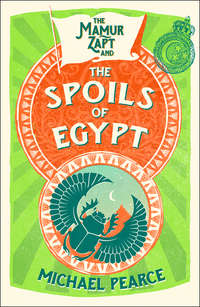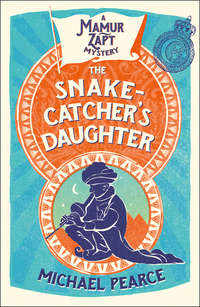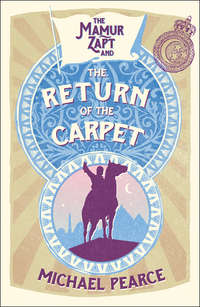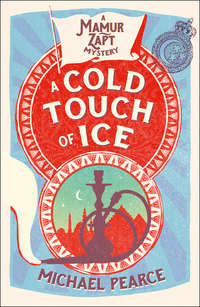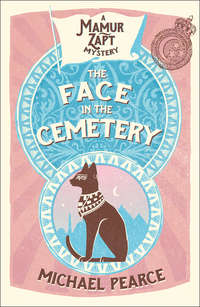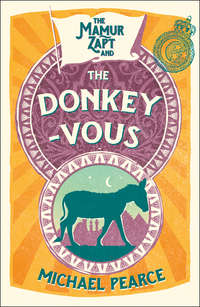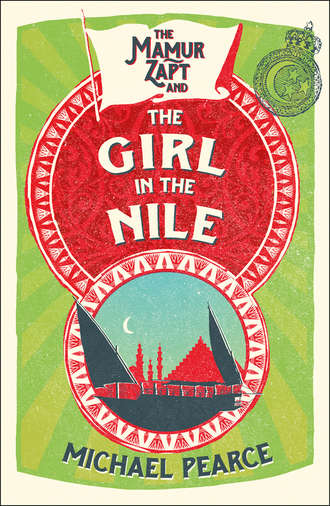
Полная версия
The Mamur Zapt and the Girl in Nile
‘Oh yes.’
‘Regulars?’
‘Yes.’
‘Are they organized? Is there a gang? A society?’
The men looked at each other, then dropped their eyes.
‘We wouldn’t know about that,’ they said.
They worked on carefully through the dovecot. When they had finished they patted the dovecot affectionately and climbed back unhurriedly down the stairs.
Owen sat thinking. It was a new possibility. Suppose the body had not been washed away? Suppose it had been interfered with? Suppose somebody had got to it?
Owen went to see the District Chief afterwards. He had a thing or two he wanted to tell him. To his surprise, when he reached the office he found the green car drawn up outside and the Prince about to go in.
‘Why, Captain Owen!’ said the Prince, pausing for him. ‘How felicitous! I was just making sure that everything was covered.’
‘Isn’t McPhee supposed to be doing that?’
‘Of course. But it sometimes helps if you remind key people which side their bread is buttered on, don’t you think?’
Owen wondered in what sense the District Chief was key.
The District Chief was, in fact, looking rather shaken.
‘After all,’ said the Prince with a wave of his hand, ‘it’s not every day that he gets called on by both Royalty and the Head of the Secret Police.’ He gave Owen a sidelong glance. ‘He is probably more impressed by the latter, I’m afraid.’
‘I doubt it, Prince.’
‘You’re his boss, aren’t you?’
‘No. He comes under Mr McPhee.’
‘Not the Mamur Zapt? Don’t they all come under the Mamur Zapt?’
‘No, Prince. The Mamur Zapt is, well, out to one side.’
‘You, too? Of course, things have changed. In my grandfather’s time the Mamur Zapt used to control everything. He was the Khedive’s right-hand man, you know. The man he relied on to keep him in power.’
‘I am afraid his scope is a little more restricted these days, Prince.’
The title ‘Head of the Secret Police’ was in any case something of a misnomer. Head of the Political Branch of the CID was the closest British equivalent. Perhaps, too, in army terms—and some considered Egypt an occupied country—Head of Political Intelligence.
‘Yes. And in the old days he used to serve the Khedive.’
‘He still does, Your Highness.’
The Prince smiled.
‘Well,’ he said. ‘I am sure you have business of your own with our friend here. Please don’t let me interrupt you.’
He walked over to one of the low, shuttered windows and sat on the sill.
‘Do carry on.’
Owen hesitated.
‘Not secret, is it? If it is, I will at once remove myself. Though, as you said a moment ago, you are in a sense one of my servants.’
‘The Khedive’s servants, certainly. No, Your Highness, you are, of course, welcome to stay. I was merely going to ask the Chief why he sent for me this morning.’
‘But is not that obvious?’
‘No, far from it. The proper procedure, you see, when a crime is reported, is to notify the Parquet, not the Mamur Zapt.’
‘I see. Well, man, answer him. Why did you send for him?’
‘The Mamur Zapt was nearby,’ muttered the Chief.
‘Well, that seems reasonable. You were nearby. And, by the way, that was very prescient of you.’
‘Hardly. I was conducting a search for arms.’
‘Really? In this vicinity? There does seem to be a lot going on in this neighbourhood. Arms, you say? Well, I suppose that’s important.’
‘Yes. To the Khedive as well as to me.’
‘You think so? Yes, I suppose you’re right. They’re just as likely to be used against us as they are against you. We and the British have a lot in common. We’re both unpopular.’
‘Only with some people, Prince.’
‘Well, yes. These Nationalists! Very trying people. My father keeps wondering whether to bring them in or keep them out. Bring them in and they want to change things. Keep them out and you deny them the chance to share in our unpopularity. Which is hardly wise, don’t you think? I’m all for bringing them in.’
‘You could always go half way. Bring them in so that they share the unpopularity but don’t give them enough power to change anything.’
‘Ah yes. Of course, that is the British solution. And very effective, too. But then, what about these guns? These arms of yours? Don’t you think there’s a danger that if people are disappointed they’re more ready to try extreme solutions? What do you do then?’
‘Conduct arms searches.’
‘I see. Why, Captain Owen, you’ve persuaded me! I am now convinced that your work was very important. Too important to be interrupted. So, fellow, why did you interrupt him?’
The District Chief, who had not altogether followed all this, looked blank.
‘I was wondering whether he’d received a phone call,’ explained Owen. ‘A phone call to suggest that there were other things more important.’
‘Oh, me, you mean? No. I always start at the top. I get round to the bottom later. As, of course, you see.’
‘I was puzzled,’ said Owen. ‘The message from the Chief came first. Before the message from Mr McPhee.’
The Prince looked at him sharply.
‘Yes,’ he said, ‘that is interesting.’ He slipped off the sill, walked across to the Chief and stood in front of him. ‘That is interesting. Well,’ he said silkily, ‘did you receive a phone call this morning?’
‘No,’ said the Chief, ‘no phone calls.’
‘Or any other kind of message?’ asked Owen. ‘Did someone come to see you, for instance?’
‘No.’
‘The Mamur Zapt will check,’ warned the Prince. ‘If I were you I’d get it right the first time.’
‘No one came. There were no messages, effendi. I swear it.’
‘So why,’ asked the Prince, ‘did you send for Captain Owen?’
‘I thought—I thought—the Mamur Zapt was near—and—’
‘There may be a simple explanation,’ said Owen. ‘Laziness.’
‘Laziness?’
‘He heard there was someone senior in the neighbourhood and saw it as a golden opportunity to pass on the responsibility.’
‘But isn’t there a difficulty here? You said yourself earlier that you are not his superior, not directly. Yes, and that in any case the normal procedure was for the matter to be reported to the Parquet.’
‘These are facts of which I meant to remind him.’
‘I see. Good.’
The Prince wheeled away.
‘Carry on,’ he said over his shoulder.
‘Another time. Your Highness, I must apologize. I have been delaying you. You yourself had business, I think, with the District Chief?’
‘Well, yes. Certainly.’
‘Don’t let me delay you further. Please carry on.’
He walked over to the window and sat on the sill.
‘Don’t mind me,’ he said encouragingly.
The Prince sat silently for a moment looking at Owen. Then he suddenly smiled.
‘Touché!’ he said. ‘However, I don’t mind you hearing.’ He crooked his finger. The Chief came towards him.
‘The body that was washed up this morning: I am interested in it. If I am interested, other people will be, too. Now. One!’ He held up his forefinger. ‘If anyone comes round inquiring, I want to know who they are. Two!’ He held up the second finger. ‘You are to tell them nothing. They may offer you money. If you take it, I shall hear, and you know what to expect, don’t you? On the other hand, if you report all to me it may be that I shall give you money. Understand? Three!’ He clasped the third finger. ‘It may be that you will come across information which you think would interest me. Information about the body, for instance. Not about the girl, I don’t need that. Just the body. I am prepared to pay for such information and pay well. Now, have you got all that?’
‘Yes, Your Highness.’
‘I’m sure you have. But just to make even surer, I am going to ask you to tell me what the three things are that could make you rich.’
He held up his forefinger and looked questioningly at the District Chief.
‘If people come asking,’ said the Chief hoarsely.
‘You are to say nothing. Good. And the second?’
‘I am to tell you who they are.’
‘Excellent!’ The Prince looked at Owen. ‘The man is well on his way to becoming rich, wouldn’t you say?’
‘There are sometimes dangers in trying to get rich too quickly.’
‘Oh, pooh! Don’t be a spoilsport. The man wants to get rich. Let him have his dream! Now, fellow, what is the third thing you have to do?’
He held up the third finger. The Chief kept his eyes fixed on it.
‘To bring you information, Your Highness. Information about the body.’
‘Good.’ The Prince patted him on the back. ‘Good fellow! You have learned your lesson.’
‘Thank you, Your Highness.’
He seemed uncertain, however.
‘Well?’ said the Prince. ‘What is it?’
‘I—I—there is a thing I don’t quite understand, Your Highness.’
‘Yes? What is it?’
‘The body, Your Highness. You said you wanted information about the body, Your Highness.’
‘Yes?’
The District Chief hesitated, then took the plunge.
‘What sort of information, Your Highness? I will go and see the body if you wish and describe it to you. In detail, naturally. But—’
He looked uncomfortably to Owen for support.
‘No, no, no!’ said the Prince hastily. ‘Not that sort of thing!’
‘Then—?’
‘The body has disappeared,’ said Owen.
‘Disappeared?’
‘Gone. From the sandbank where it was apparently found.’
‘Gone?’ said the District Chief, as if he could not believe his ears. ‘Gone?’
‘That’s right. When I got there it had gone.’
‘Abu?’ said the Chief faintly. ‘Ibrahim?’
‘We got there together. It had already gone. Ibrahim rather doubted it had been there in the first place.’
The Chief unexpectedly went ashen. He bowed his head between his hands.
‘God!’ he said. ‘God!’
‘I want to find it,’ said the Prince. ‘Quickly, and before anyone else does. Got it?’
CHAPTER 2
Unusually, there was a meeting on the British side about how to handle it. Garvin was there, Commandant of the Cairo Police and Owen’s nominal superior; McPhee, Deputy Commandant, earnest, concerned and straightforward—too straightforward by half to be a Cairo policeman and far too straightforward for something like this; Paul, an aide-de-camp of the Consul-General’s; and Owen.
The Consul-General usually steered clear of too direct an involvement in Egyptian policing. Garvin reported formally to the Khedive—and the Consul-General was punctilious about the forms. He was particularly careful of any involvement with the Mamur Zapt, which was why Owen not only reported formally to the Khedive but was nominally subordinate to Garvin.
It was, therefore, unusual to have a meeting of this sort. But then, as Paul, chairing the meeting on behalf of the Consul-General, made clear, the circumstances were unusual.
‘It’s not every day that an heir to the throne gets involved in something like this.’
‘Is he an heir to the throne?’
‘One of many. The Khedive has a number of sons and all of them see themselves as potential heirs.’
‘Where does this one fit in?’
‘He is the son of the Khedive’s third wife, so not high up in the stakes. On the other hand, his mother is still a favourite of the Khedive’s, which is often significant. He is able and energetic, which makes him stand out among the Khedive’s progeny. And front runners in a thing of this sort are unfortunately prone to accidents.’
‘He seemed a bit of a playboy to me,’ said McPhee.
‘That car, of course. But look at it another way: as an indication of Narouz’s interest in things modern and things Western.’
‘I see.’
‘Yes. I thought you would. The Consul-General, and Al-Lurd before him, see him as a man England could do business with.’
Al-Lurd was Lord Cromer, the man who had run Egypt for over twenty years before the present incumbent. If two such people, the one popular with Conservatives, the other a nominee of the new Liberal Government in London, took that view, the Prince had a lot going for him.
‘It would be unfortunate,’ said Paul, ‘if he were to be derailed at this point.’
There was a little silence.
‘Is that a directive?’ asked Owen.
‘A hint, rather. Call it: putting you in the picture. Alerting you to the position of His Majesty’s Government.’
‘As strong as that?’ said Garvin.
‘I can relax it a bit, provided you’ve got the general idea. If he’s done anything really wicked I don’t think HMG would be prepared to go out on a limb on his behalf. There are, after all, other possible candidates. But if it’s only mildly wicked we would feel it a pity to be too legalistic.’
‘What counts as only mildly wicked?’
‘I don’t think I’d like to give you a general answer. These things have to be decided in the light of circumstances.’
‘I’m not sure I find that very helpful,’ said Garvin. ‘What exactly is to be our position?’
‘Aloof,’ said Paul. ‘Aloof, but watching.’
‘Not get too close to it? Well, that’s probably sensible.’
‘Should be manageable,’ said Garvin. ‘After all, it’s Parquet business really.’
‘Quite. The police will assist the Parquet and work under their direction as usual. But that’s at the local level. There’s no need for senior involvement.’
‘I quite agree,’ said Garvin. ‘No point in that at all.’
No fool he.
‘McPhee’s involved already,’ said Owen.
‘I think he can drop out now.’
‘The Prince thinks he’s involved.’
‘The Prince, I believe, has changed his mind.’
‘Since yesterday?’
‘Yes.’
‘I see.’
Someone else been making telephone calls?
‘I think that’s very reasonable,’ said Garvin. ‘McPhee’s got enough demands on his time already. When all is said and done, this is just a straightforward crime and we wouldn’t normally put him on to something like this.’
‘We don’t even know it is a crime,’ Paul pointed out.
‘No, no, of course not,’ said Garvin, hurriedly changing tack. ‘Could be just an accident.’
‘It’s for the Parquet to decide how it wants to treat it. Crime or accident.’
He looked at Owen.
‘They’ve put Mahmoud on to it, haven’t they?’
‘Yes.’
‘How will be play it?’
‘Straight.’
‘Mahmoud’s a good chap,’ said McPhee.
‘Mahmoud’s going to have to take some hard decisions,’ said Paul.
He finished his coffee.
‘Which brings me to the final thing we need to discuss. You asked me about the stance we were to adopt. I said aloof. I also said watching.’
‘We wouldn’t want it to go wrong,’ said Garvin.
‘We couldn’t afford for it to go wrong. We’ve got to have someone in there.’
‘I thought you said you didn’t want any senior involvement?’
‘Overt. No overt involvement at the senior level.’
Another little silence.
‘This is hardly straightforward policing,’ said Garvin slowly. ‘I would say it was more—political.’
‘You said it was straightforward policing a moment ago. When you wanted to shift it to the Parquet.’
‘A straightforward crime. Not straightforward policing. There are other dimensions here. Political ones.’
‘I think Owen’s the chap,’ said Paul.
‘I don’t like it.’
‘Who does?’
‘I’m not going to get involved in any cover-up.’
‘I don’t think Owen should be asked to cover up anything,’ said McPhee.
‘We’re not asking him to. Not yet, anyway. And I don’t think it need come to that, not if it’s handled in the right way. With a bit of dexterity, I mean. The Press, the politicians, the Prince himself. Mahmoud. The Khedive, too, perhaps.’
‘It’s a tall order.’
‘I’ve every confidence in the boy,’ said Paul, watching him.
‘I still don’t like it. I’m not going to get involved in any covering up.’
‘I hope it won’t be necessary. But this is politics. You know, you policemen are lucky. If you meet a bad guy, you lock him up. If I meet a bad guy I usually have to shake hands with him and do a deal.’
‘I’m not shaking hands,’ said Owen.
Paul smiled.
‘You’re in politics now,’ he said, ‘whether you like it or not. And I think you’ll find you’re going to have to take some hard decisions. Like Mahmoud.’
‘And, of course, there was the harem,’ said the eunuch.
‘The harem?’ said Owen, startled.
‘The Prince always travels with one.’
‘Even to Luxor?’ asked Mahmoud.
‘Certainly to Luxor. The Prince has an estate there.’
‘And that’s where he had been this time?’
‘Yes.’
They were sitting in the cabin of the dahabeeyah. It was a modern one, specially fitted out for the Prince, and had windows. Through the window beside him Owen could see a large rat sunning itself on a mooring rope.
‘I had gathered the impression that the Prince had intended to be away only for a few days,’ said Mahmoud.
‘That is true.’
‘How long did he spend at the estate?’
‘Two days.’
‘Only two days? That is a very short time, especially when you have to travel all that way.’
‘The Prince does not like his estate.’
‘He was principally interested in seeing Luxor, then?’
‘The Prince does not like Luxor, either.’
‘What does he like?’ asked Owen.
‘Cannes.’
In the old days, before the advent of Mr Cook’s steamers, when tourists used to sail down to Luxor by dahabeeyah, the port had been full of the old-fashioned, native sailing craft. The tourist would come and choose one. It would then be towed across the river and sunk—temporarily. This was to get rid of the rats. The trick was, though, to sail away immediately that dahabeeyah had been raised. Otherwise it would be reinfested—along the ropes—at once.
‘What, then, was the purpose of his visit?’ asked Mahmoud.
The eunuch shrugged.
‘I wouldn’t have thought the Prince was one to wish to spend a week admiring the beauties of the river bank.’
‘The Prince spent his time in the cabin playing cards with the Prince Fahid.’
‘Ah? The Prince Fahid was on the boat, too?’
‘Yes.’
‘Had he, too, brought his harem?’
‘The Prince Fahid is too young to have a harem.’
‘He is Prince Narouz’s son?’
‘Nephew.’
‘The Prince was perhaps showing him the sights?’
‘What sights?’
‘Luxor?’
‘The Prince is not interested in antiquities.’
‘What, then, was the point of the journey?’
‘I don’t know. Perhaps you had better ask the Prince.’
Mahmoud sighed. He had warned Owen beforehand to expect this. The Prince’s entourage wouldn’t say anything. He was finding it difficult to extract even the names of the people who had been on the dahabeeyah.
‘Let us go back to the harem,’ he said. ‘How many wives has the Prince?’
‘Four.’
‘And they were all there with him?’
‘Except Latfi, who is having a baby.’
‘Three, then. There were three in the harem quarters?’
‘You spoke of wives only.’
‘There were others, then? How many?’
‘Seven.’
‘Can you give me their names?’ said Mahmoud, taking out a pencil and notebook.
‘I am afraid not.’
‘Are you sure? You knew Latfi’s name.’
‘I know all their names. But it would not be proper for me to tell you the names of His Highness’s wives and concubines.’
‘But I need to know! I am conducting an investigation!’
‘That’s as may be, but a man’s harem is his own affair.’
‘Not when part of it disappears overboard.’
‘What do you mean?’
‘You know very well what I mean,’ said Mahmoud, exasperated. ‘I told you! His Highness has reported that a passenger on the dahabeeyah with him—’
‘But she wasn’t in the harem.’
‘She wasn’t?’
‘No!’
‘What was she doing on board, then?’
‘Well …’ The eunuch hesitated.
‘You may speak,’ said Owen encouragingly. ‘Mr el Zaki puts these questions with the knowledge and agreement of His Highness,’ possibly stretching the truth a little.
‘She was helping to entertain the princes.’
‘Helping?’
‘There were two others. They came on board at Beni Suef.’
‘On the way up to Luxor or on the way back?’
‘On the way up.’
‘Have you any objection to telling me their names?’
‘I don’t know their names,’ said the eunuch.
The incident had happened on the return journey. The dahabeeyah had moored for the night and the three girls had been up on the top deck enjoying the evening breeze. They had stayed up there with the princes until it had become dark, early, of course, in Egypt.
Prince Narouz, bored, had descended first. About half an hour later, according to the eunuch, Prince Fahid had followed him, accompanied, possibly reluctantly, by two of the girls. The third had remained on the top deck.
And it was from the top deck, apparently, that she had disappeared. Late, quite late, someone had called up to her, asking when she was going to come down. Some time after, not having received a reply, they had sent the eunuch to fetch her. He had found the top deck empty.
At first he had assumed that she had climbed down to the lower deck and gone forward. Some members of the crew had been sitting in the bows and it was only when they denied having seen her that he began to search seriously.
‘The steersman?’ said Mahmoud. ‘Surely the steersman must have seen?’
On a dahabeeyah the steersman was placed aft, immediately behind the cabin. He usually stood on a little platform raised high enough to enable him to see over and past the cabins when the boat was moving.
After the boat had stopped for the night there was always some work still to be done on the platform. The rudder bar had to be lashed and the ropes stowed. The eunuch said, however, that the steersman had finished his work and gone forward before all this happened.
The eunuch had made a cursory search and then had reported the matter to Prince Narouz. Narouz had been angry, first with the girl for playing the fool and then with the eunuch for not finding her.
He had searched the boat himself. Gradually he came to realize that something was seriously amiss.
By now, of course, it was dark and hard to see anything on the water. The Prince had had all the men up on deck scanning the river with the aid of oil lamps. Meanwhile the eunuch had been concluding a search below.
When he had gone up on deck again he found that the Prince had lowered two small rowing boats and was systematically scouring the river. This had continued all night. As soon as it was light the dahabeeyah had sailed down river with everyone on deck keeping an eye out. They had seen nothing.
In the end they had abandoned the search, set the Prince down so that he could report the incident at once, and sailed on to Bulak.
‘I shall need to speak to the Ship’s Captain, the Rais,’ said Mahmoud. ‘Also to the crew. One by one. Also to the servants. Those girls, of course. Then the harem.’
‘The harem!’ said the eunuch, shocked. ‘Certainly not! What sort of boat do you think this is?’
The dahabeeyah was moored across the river from the main port. This was the traditional mooring place for dahabeeyahs and in the old days, before Mr Cook had come with his steamers, there would have been over two hundred of them nudging the bank. They were the traditional way for the rich to travel by water—and in Egypt everyone travelled by water. The Nile was the main, the only, thoroughfare from north to south and the dahabeeyah was its Daimler.
It was a large, flat-bottomed sailing boat rather like a Thames barge or, as tourists were over-prone to comment, a College houseboat, except that its cabins were all above deck and all aft. This gave it a weird, lop-sided look and might have made it unstable had that not been compensated for by putting the hold forward.


